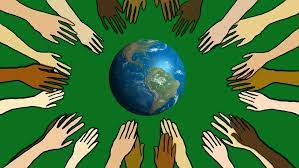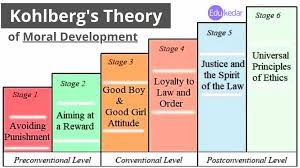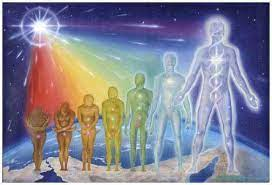An online magazine of faith based on a free and responsible search for truth and meaning. The mission of Unitarian Universalism: A Way Of Life ministries is to provide information, teach skills, and clarify values to facilitate the evolutionary development of increasingly higher levels of spiritual development for human beings around the world.
Thursday, March 30, 2023
Tuesday, March 7, 2023
Awareness of the interconnectedness of life.
Modern science is now increasingly able to demonstrate what mystics have always intuited. The relatively new discipline of ecology is one of the most obvious scientific expressions of the interconnectedness of biological life. Other sciences have also made breakthroughs that are less easy to grasp but even more extraordinary in their implications.
Wigglesworth, Cindy. SQ21: The Twenty-One Skills of Spiritual Intelligence (p. 69). SelectBooks, Inc.. Kindle Edition.
The sixth skill of spiritual intelligence, awareness of the interconnectedness of life, is repressed in our contemporary consciousness by the ubiquitous requirements of the capitalistic system which denies, and if even aware, refuses to acknowledge what are called “externalities” which allows us to hide the true costs of things.
The hiding of the externalities contributes to living in an illusionary world which, if not in the short run, will have negative consequences for the ecosystem in which we live in the long run. Recognition is slowly beginning to dawn on homo sapiens of the interconnectedness of life as we become consciously aware of what we have done to planet Earth’s climate.
Some people say “ignorance is bliss” while others encourage us to wake up. Unitarian Universalists join together to affirm and promote an awareness of the interdependent web of all existence of which we are a part.
We ask ourselves to what extent, low, medium, or high, are we aware of the interconnectedness of life and make decisions about our actions accordingly?
Sunday, March 5, 2023
Spiritual Intelligence - Skill 6: Awareness of Interconnectedness Of Life
Cindy Wigglesworth breaks her model of the Twenty-One skills of spiritual intelligence into four quadrants. The first five skills are in quadrant one which is labeled “Self/ self awareness.” The next six skills fall in quadrant two which is labeled, “Universal Awareness.” The first skill in this second quadrant is the awareness of interconnectedness of life. This skill also happens to be identified in the seventh of the seven principles of Unitarian Universalism which is the affirmation and promotion of respect for the interdependent web of all existence of which we are a part.
Albert Einstein wrote in a letter to a grieving friend that, “A human being is part of a whole, called by us ‘Universe,’ a part limited in time and space. He experiences himself, his thoughts and feelings, as something separated from the rest—a kind of optical delusion of his consciousness. The striving to free oneself from this delusion is the one issue of true religion.”27 What Einstein states so beautifully is a truth that more and more of humanity are waking up to: the fact that we are not isolated islands, but rather we are threads in a vast web of interconnectedness.
Wigglesworth, Cindy. SQ21: The Twenty-One Skills of Spiritual Intelligence (p. 68). SelectBooks, Inc.. Kindle Edition.
During the Covid-19 pandemic there were shortages in many stores blamed on the broken supply chains. The term “supply chain” became a common concept when toilet paper was not on the store shelves.
To what extent are we aware of the supply chains upon which we are dependent for resources that contribute to our well being? Most of the elements of these supply chains are invisible to us. We, ourselves, are components of many supply chains and our activities have positive and negative effects on the outputs of these chains. To what extent are we aware of and grateful for the jobs that people perform to keep supply chains working effectively and efficiently? Looking at work from the perspective of systems thinking leads to the conclusion that most work is sacred.
The awareness of interconnectedness and the concomitant awe and gratitude is an important skill of spiritual intelligence.
Friday, March 3, 2023
Skill 5 - Awareness of the Ego self/Higher Self - Who is driving my life?
The idea of an ego self and a genuine self is accepted in psychology and is a significant concept in Spiritual Intelligence. The ego self is the façade which we put forward to get along, to belong, to manipulate others to interact with us to achieve our goals.
The Higher Self is the genuine self, the real deal, what I really think, what I really feel, what I really prefer. The Higher Self is honest while the ego self is false. The question raised by this skill in Wigglesworth’s model of SQ is to what extent are we aware of the difference, and know where we are coming from at any particular time?
The indicator question is “Can you consistently hear the voice of your Higher Self? The possible answers are “low”, “medium”, or “high.”
There are many examples of using this skill such as going to confession after examining our conscience for mistakes (sins) we have made. In Twelve Step programs the fourth step, “do a fearless moral inventory” and report it to another human being, is a significant example.
In Psychotherapy, the client can express what they really think, what they really feel, and what they really prefer in a non anxious, non judgemental relationship. Good psychotherapy contributes to an awareness of the Higher Self.
The level of competence in the skills of spiritual intelligence is equivalent to one’s mental health.
SQ 21 0 The Twenty-One Skills Of Spiritual Intelligence
During March 2023 UU A Way Of Life will continue the discussion of Cindy Wigglesworth's book, SQ 21: The Twenty-One Skills of Spiritual Intelligence. The posts which are part of this discussion are tagged SQ.
Friday, December 2, 2022
Spiritual Intelligence Skill Four - Complexity of Inner Thought.
Life is not black and white but a lot of gray. The ego mind likes to dichotomize and play one off the other. We constantly double bind ourselves into believing that we have to choose one or the other alternative when there can be a third, fourth, and fifth way. The questions to be asked are: Can you hold contradictory ideas of the “right thing” in your mind simultaneously and perceive the larger system and context which allows other options? Can you make decisions in the face of uncertainty?
The conventional level of morality would have us choose between right and wrong but what is legally right is sometimes morally wrong and what is morally wrong is sometimes legally right, and the mature person can rise above the conventional level of norms and can apprehend the higher good and truth which is above legal and moral codes. This level of spiritual judgment is called “post conventional.”
In Unitarian Universalism, the fourth principle is the affirmation and promotion of the free and responsible search for truth and meaning. This search takes the seeker into the realm of complexity beyond the dichotomous world of simply right and wrong. Rather than black and white and compliance with some externally imposed moral code, the seeker is encouraged to rise above this code to apprehend the higher Truth, Goodness, and Beauty. Jesus said “Give to Caesar the things that are Caesar’s and to God the things that are God’s.
Wednesday, November 30, 2022
Spiritual Intelligence Skill Three- Values Hierarchy.
What matters the most to me in my life are _____________, ____________________, and ______________. Sometimes I ask, “If you could have three wishes what would you wish for?”
Values are things we do when we put our money where our mouth is, when we walk the talk. Spirituality has to do with the things that are of ultimate importance.
The questions are “Can you name and rank your top five personal values? Do you keep them in mind when making important decisions?”
As we grow and mature our value priorities change. We tend to move from the egocentric and ethnocentric to world centric and integral. An indication of a person’s maturity is their values hierarchy.
In Unitarian Universalism we join together to affirm and promote the free and responsible search for truth and meaning. Truth and meaning comes from reflecting on the things that are most important to us in our lives.
Tuesday, November 29, 2022
Spiritual Intelligence Skill Two - Awareness of Life Purpose
Paul Pearsall, the neuropsychologist, said that the three big existential questions that every person has to deal with are: Why was I born? What is the purpose of my life? What happens when I die?
The ability to understand and appreciate one’s purpose in life is to provide direction and meaning. This ability to set goals for oneself and pursue them even in the face of obstacles, barriers, and frustration is considered one of the important skills of emotional intelligence. The psychologist Angela Duckworth calls this tolerance of frustration, and persistence in spite of it in pursuing one’s goals, “grit.”
In Christian Pastoral counseling this desire to clarify one’s purpose in life is called “discernment.” The idea is attempting to discern one’s calling from God to become the person God created us to become and to do with our life what God is calling us to do.
The word, “vocation,” comes from the Latin word “vocare” which means to call. Our life’s purpose is a calling from God. To never apprehend this purpose or seek it or to ignore one’s calling is to never have lived one’s authentic life. Socrates said, “An unexamined life is not worth living,” and the bumper sticker reads “An unlived life is not worth examining.”
So two questions for consideration in developing this skill are: “To what extent (low, medium, high) do you think you can explain your life purpose to others? Do you stay focused on it consistently?”
Back in the 60s we would ask whether people have their shit together. Some do, some don’t, most are struggling. Having your shit together in more professional language is what psychologists call a “well integrated personality.”
In Unitarian Universalism some people join together to affirm and promote the free and responsible search for truth and meaning. This search includes the desire to discern God’s will for who I am to become and what it is I am to do with my life.
Monday, November 28, 2022
Spiritual Intelligence Skill One - Self awareness: What Makes You Tick?
The first quadrant of skills in Cindy Wigglesworth’s model of Twenty-One skills of spiritual intelligence is called “self awareness.” In other words, does a person know what makes them tick?
The first spiritual skill of the twenty-one is “Awareness of Own Worldview - What filters do I see through?” Wigglesworth writes:
“...the recognition that the way you see is not simply “the way things are”—it is a particular view. The word “worldview” comes from the German weltanschauung, composed of the words for “world” and “outlook.” It is commonly used to refer to the framework of beliefs and ideas through which we interpret the world around us. Those beliefs and ideas are inevitably going to be shaped by the culture in which you have grown up, your religious background, your ethnicity, and many other factors.”
Wigglesworth, Cindy. SQ21: The Twenty-One Skills of Spiritual Intelligence (p. 49). SelectBooks, Inc.. Kindle Edition.
Another term for this “world view” is “thought system.” What is the thought system through which a person perceives the world and interprets one’s perceptions?
Ken Wilber describes two developmental paths when it comes to spirituality: “waking up” and “growing up.” Waking up is the development of consciousness from physical to psychological to social to spiritual to transcendent. The lowest level is egocentric and the highest level is nondual consciousness or what some seekers call “enlightenment.”
Growing up is the development of thought systems which go from magic to mythic to rational to holistic to integral.
The basic skill is knowing that one’s thought system is only one of many that people experience and that there are developmental levels of maturity through which one can grow and wake up. Wilber makes the distinction between waking up which is an experience and growing up which is a structure of thinking.
The question to be considered in assessing one’s skill level is “To what extent can you describe the impacts of your family upbringing, your culture, your peer group, the media, on your mental assumptions about our own functioning and the world in which you participate?” Low, medium, high.
In other words, to what extent do you understand and can explain what makes you tick?
In Unitarian Universalism the fourth of seven principles is to affirm and promote the free and responsible search for truth and meaning. This search involves understanding the thought system from which one is operating and the desire to grow up and wake up. As the bumper sticker says “Change is inevitable. Progress is optional.”
Saturday, August 13, 2022
SQ skill #1 - Do you know what makes you tick?
Today UUAWOL is starting a new feature addressing the skills of Spiritual Intelligence as described by Cindy Wigglesworth in her book The Twenty-One Skills of Spiritual Intelligence.
Since the purpose of the UUAWOL blog is to add value to its reader's spiritual life, it would be helpful in pursuing this purpose if reader's would leave comments about the significance of the question in focusing on their spiritual growth.
The third principle of Unitarian Universalism is the acceptance of one another and encouragement to spiritual growth. Your comments would be a way of sharing your experience as a means of encouraging the spiritual growth in oneself as well as with others.
Here's the first question; Do you know what makes you tick and can you explain it to others?
"To what extent do you think that you can explain to others the impacts of your culture, your upbringing, and your mensal assumptions on how you interpret the world around you?"
Not at all Somewhat Mostly Completely
Friday, May 20, 2022
SQ - Levels of moral development
Practically all human problems (except natural disasters) can be understood, at least partially, as problems of consciousness.
McIntosh, Steve. The Presence of the Infinite . Quest Books. P.225
The purpose of the psychoanalytic method is to make the unconscious and the subconscious conscious. Jung believed this to be true at the cultural level as well as at the individual level. Therapists who work from interpersonal and systemic models also believe this to be true of long term committed relationships and in high functioning families.
So if Steve McIntosh is right and practically all human problems can be understood as problems of consciousness, why don’t we have and use more models of the stages of consciousness? If we had such models perhaps we could discard our dependence on the DSM.
If you are curious, integral philosophy and psychology describes such models.
One model I have found very helpful is Kohlberg’s model of moral development which is based on preconventional, conventional, and post conventional viewpoints. The conflict most often seen in psychotherapy is the struggle between the preconventional and the conventional. People stuck at a preconventional level of morality are described as lacking empathy and compassion while people at the conventional are described as anxious and obsessive being codependent and people pleasers. People at the post conventional level are often seen as wise and mature and more mentally healthy.
Saturday, May 14, 2022
Spiritual intelligence: the stages
What are the stages of spiritual intelligence? There are many models. For our use on UU A Way Of Life the description of the stages of spiritual intelligence involves five:
Concrete, literal
Magical and superstitious
Conceptual and reasonable
Holistic and integral
Mystical, nondual, energizing.
People grow through these stages as well as organizations like churches and cultures. People, socialized in a religious tradition, can be at different stages of spiritual intelligence as well. Some religions and churches do a better job of nurturing and facilitating this growth than others. Many churches have a center of gravity in one of these stages and attract membership with participants being primarily at one of these stages. Often as growth occurs and spiritual intelligence develops, schism can occur or some people have grown beyond the bulk of the congregation and will move on seeking support from a new group of people who share their level of SQ.
One indicator of a vibrant religion and church is one that can serve the needs of people at different levels of spiritual intelligence. These religions and churches can be described as “resilient” as compared to rigid and even brittle.
Spirituality is different from religion. Some people are spiritual but not religious and some people are religious but not spiritual and sometimes people are both religious and spiritual. At UU A Way of Life we are spiritual, but not religious. The kind of Unitarian Universalism that UU A Way Of Life attempts to share and incubate is not organizational or institutionally based. The kind of Unitarian Universalism that UU A Way Of Life describes, acknowledges, and facilitates is a way of life not merely a social club which one might attend on Sundays to have coffee and cake and socialize.
The mission of the church is to facilitate the spiritual evolution of individuals and cultures and all of humanity and sentient beings. The mission of UU A Way Of Life is to help people experience the good, the true, and the beautiful and become aware of the presence of the infinite in the finite.
You, your family, your community, your nation, the whole world is invited to join us. What is most beautiful, true, and good in your life? Leave a comment.










